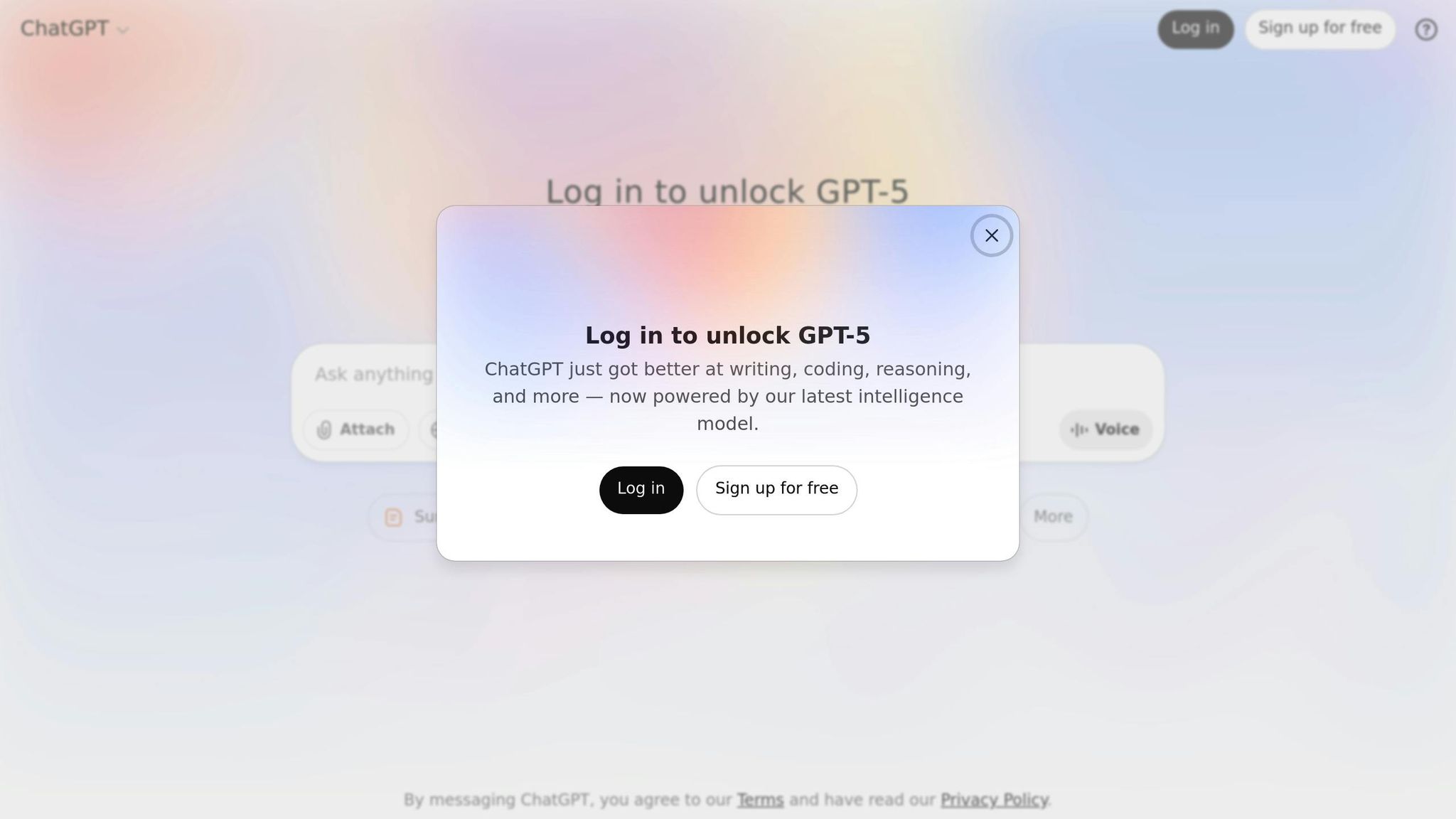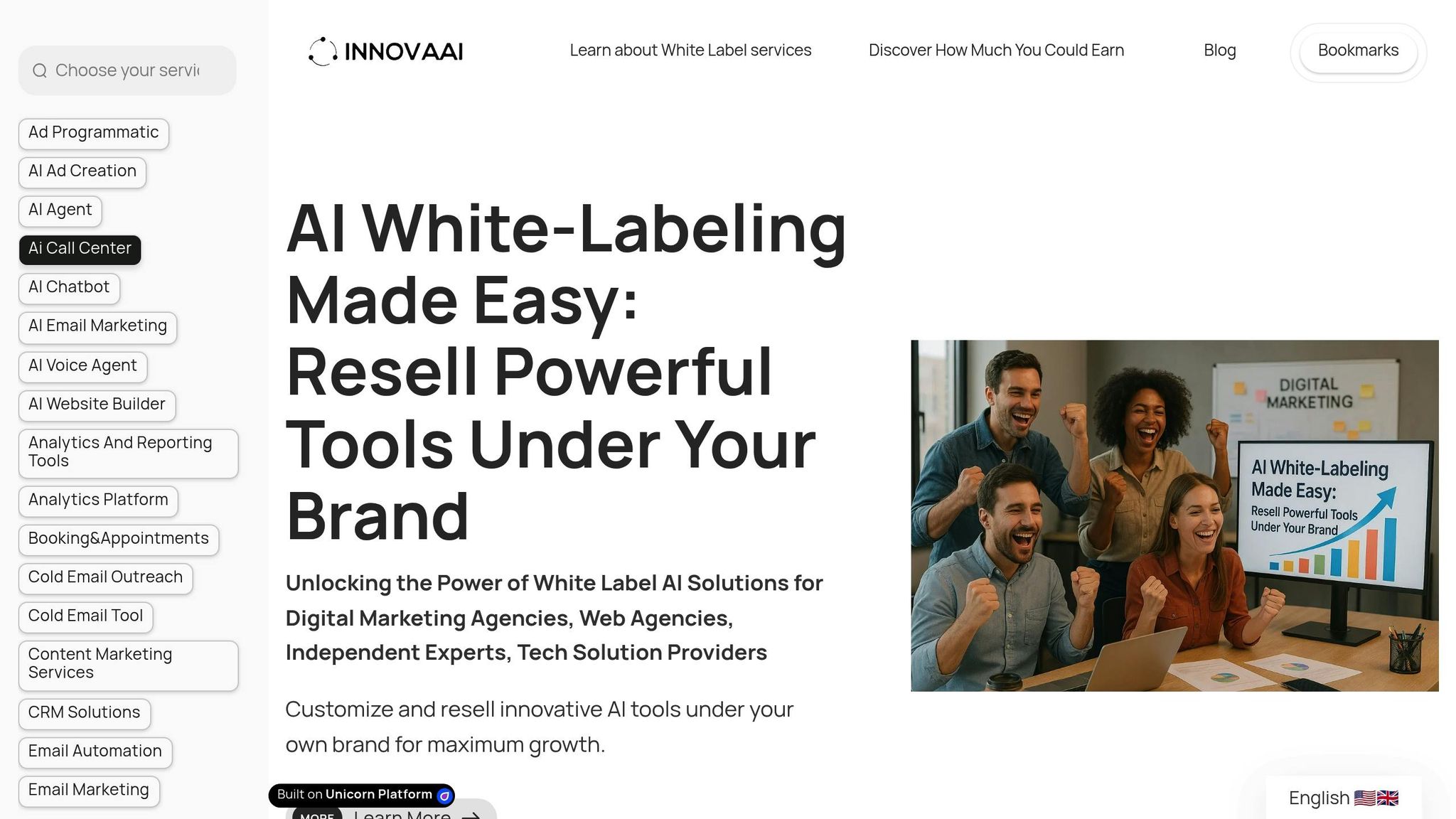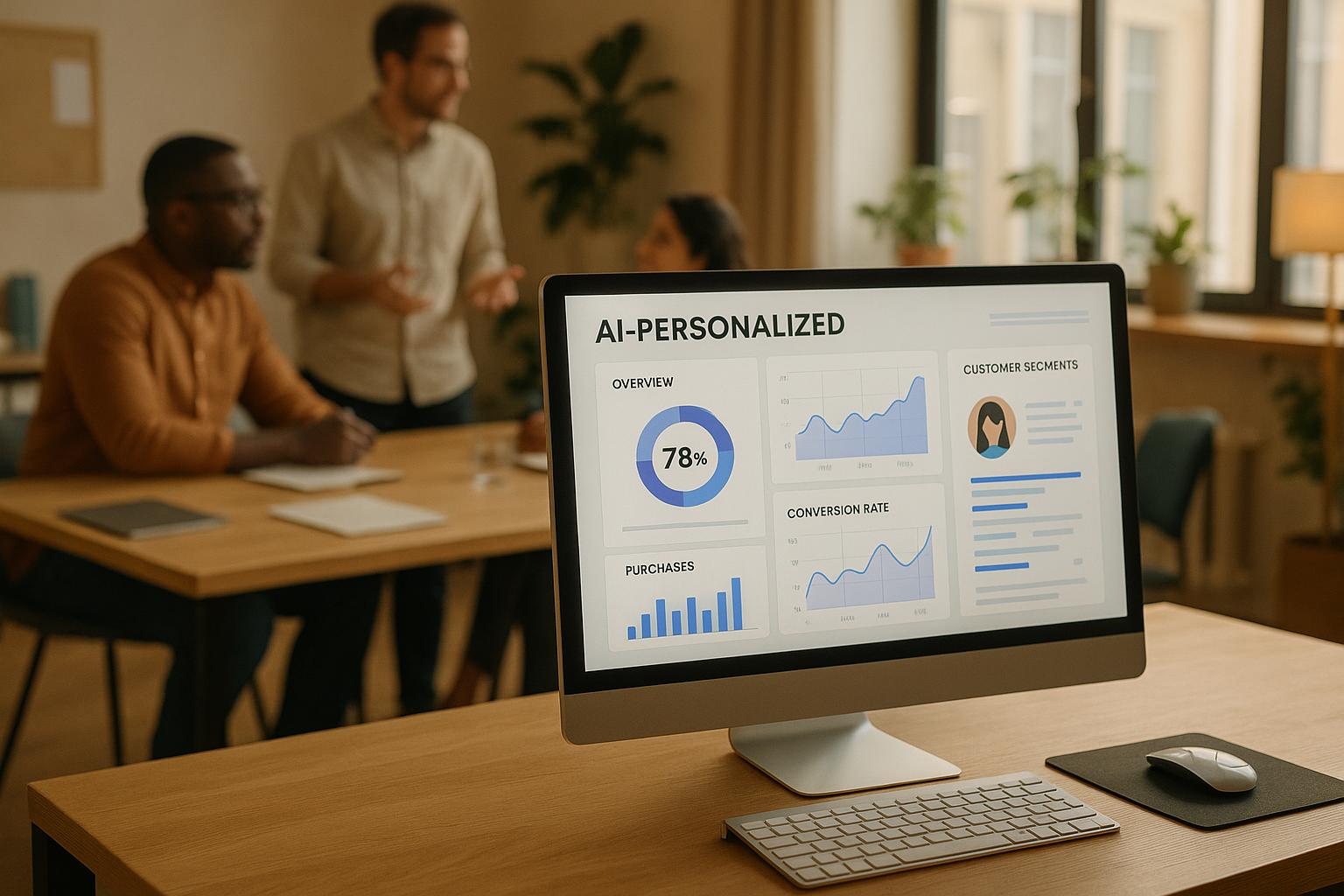- Customization: Platforms like White Label AI Solutions let agencies rebrand and adjust chatbots to match their needs, offering flexibility for growth.
- Integration: Advanced options sync with CRMs, calendars, and analytics tools for seamless data flow, while basic chatbots stick to simple calendar links.
- Features: Enterprise chatbots handle complex tasks like multi-location scheduling and sentiment analysis, while simpler tools cover basic appointment booking and reminders.
- Pricing: Costs vary. Scalable options like White Label AI Solutions provide tiered plans, while enterprise chatbots involve higher setup costs but offer advanced capabilities.
Quick Comparison
| Attribute | White Label AI Solutions | Chatbot A | Chatbot B |
|---|---|---|---|
| Customization | High | Low | Moderate |
| Integration Scope | Extensive | Basic | Comprehensive |
| Features | Moderate to Advanced | Basic | Advanced |
| Pricing Structure | Scalable Tiers | Low-Cost Monthly | Tiered + Setup Fees |
| Target Market | Agencies | Small Businesses | Large Enterprises |
Bottom Line: Agencies seeking growth might prefer White Label AI Solutions for its rebranding potential. Small businesses can start with basic tools, while enterprises may benefit from advanced features in robust platforms. Choose based on your needs, budget, and technical resources.
Ai Booking Bot: Replace Your Appointment Setters with ChatGPT and GoHighLevel

1. White Label AI Solutions

White Label AI Solutions provides a customizable appointment scheduling chatbot specifically designed for digital marketing agencies. This platform delivers AI-driven tools that agencies can rebrand as their own, setting the standard for integrated chatbot solutions.
Conversational Capabilities
These multilingual chatbots engage with prospects in real time, qualify leads, and offer 24/7 support. This means agencies can capture leads even during off-hours, making it easier to serve a diverse range of U.S.-based clients and secure bookings during evenings and weekends.
Scheduling Features
The platform combines lead generation with a streamlined scheduling interface, capturing and qualifying appointment details effortlessly. Agencies can adjust the booking process to align with their specific operational needs, ensuring a smooth experience for both clients and prospects.
Integrations
White Label AI Solutions seamlessly integrates with CRM systems, syncing appointment data to existing workflows. Alongside this, the platform offers detailed analytics and customizable dashboards, giving agencies valuable insights into booking trends and overall performance. These tools help refine engagement strategies and improve operational efficiency.
Pricing and ROI
The solution is available in three pricing tiers: the Basic Plan for small teams, the Pro Plan for growing agencies, and the Enterprise Plan for larger-scale operations. While exact pricing isn’t disclosed, the platform is designed to be scalable and budget-friendly. Its white-label branding feature allows agencies to market the chatbot as their own service, creating an additional revenue stream. For agencies managing multiple client accounts, the Enterprise Plan offers unlimited scalability and priority support, delivering significant returns on investment.
2. Chatbot A
Traditional appointment chatbots are designed to handle basic booking tasks and typically function as standalone tools. While they get the job done for simple scheduling needs, they fall short when it comes to integrated lead generation. For agencies that require more advanced features and customization, these limitations can be a real drawback.
Conversational Capabilities
Most standard chatbots rely on pre-programmed responses to manage straightforward tasks like scheduling and answering basic questions. But when faced with more complex inquiries, they often hit a wall.
Their rigid decision trees make it hard for them to adapt to nuanced conversations. While they can operate 24/7, their ability to genuinely engage users or build meaningful connections is limited compared to AI-powered solutions that offer more dynamic interactions.
Scheduling Features
These chatbots typically cover the basics: calendar integration, time slot selection, and automated confirmations through tools like Google Calendar or Outlook. They also support reminders via email or SMS, which can help cut down on missed appointments.
However, the customization options are usually minimal. Businesses often find themselves having to adapt their workflows to fit the chatbot's predefined structure, rather than the other way around.
Integrations
When it comes to integrations, these tools are fairly limited. They usually offer one-way syncing with popular calendars and basic CRM systems, focusing solely on creating appointments.
Their analytics features are also quite basic, often limited to metrics like the number of appointments booked or completed. For businesses looking to gain deeper insights into their scheduling trends or customer behavior, additional tools are often required.
Pricing and ROI
These chatbots are generally subscription-based, and while the upfront costs might seem reasonable, expenses can quickly add up if advanced integrations are needed.
Measuring ROI can be tricky with these tools since they focus almost entirely on scheduling rather than lead generation or conversion optimization. Without robust analytics or lead qualification features, their overall impact on business growth is limited. Up next, we’ll explore what Chatbot B brings to the table.sbb-itb-537ed4c
3. Chatbot B
Enterprise appointment chatbots take scheduling to the next level with advanced features and smooth integrations, making them a go-to solution for larger organizations. These tools are built to handle the complex scheduling needs of businesses operating across multiple departments or locations.
Conversational Capabilities
These chatbots leverage natural language processing (NLP) to handle more intricate conversations, far beyond simple command-and-response interactions. They can manage multi-step dialogues, gather detailed booking information, and even use sentiment analysis to identify customer frustration. Plus, they support multiple languages, making them suitable for serving a diverse customer base.
That said, their reliance on predefined conversation flows can sometimes limit their ability to handle unexpected or unique queries effectively.
Scheduling Features
Enterprise chatbots come equipped with advanced scheduling tools designed to manage complex scenarios. They handle tasks like resource allocation, group bookings, and intricate availability management. Whether it’s booking conference rooms, equipment, or staff, these chatbots simplify the process. They also support features like waitlists, automatic rebooking, recurring appointments, and extensive customization options to fit specific business workflows.
Integrations
These chatbots don’t operate in isolation - they offer seamless two-way synchronization with major CRMs like Salesforce and GoHighLevel, as well as calendar systems like Microsoft Exchange and Google Workspace. They also integrate with payment processors for added convenience. On top of that, they provide powerful analytics, including conversion tracking, customer journey insights, and detailed booking reports, giving businesses a complete view of their scheduling performance.
Pricing and ROI
Pricing for enterprise chatbots typically follows a tiered structure, based on factors like the scale of implementation, conversation volume, number of integrations, and active users. Additional costs may include implementation, training, and customization. While the upfront investment can be significant, the return on investment (ROI) is clear. Businesses benefit from better conversion rates, reduced workloads, and performance metrics that are easy to measure. These advantages make them a strong contender for organizations looking to streamline operations and boost efficiency.
Advantages and Disadvantages
When choosing the right solution for your business, it’s essential to weigh the pros and cons based on your needs and budget.
| Attribute | White Label AI Solutions | Chatbot A | Chatbot B |
|---|---|---|---|
| Primary Advantage | Fully customizable branding with resale opportunities | Affordable with basic scheduling tools | Advanced features and integrations for large enterprises |
| Main Disadvantage | Requires technical setup and ongoing management | Limited customization and features | High costs and implementation complexity |
| Feature Complexity | Moderate to advanced; highly flexible | Basic appointment scheduling and reminders | Enterprise-level capabilities with multi-department support |
| Integration Scope | Extensive API options for custom setups | Works with popular calendar apps | Integrates with CRM, payments, and analytics tools |
| Scalability | Easily scales for multiple client brands | Best for small to medium businesses | Designed for large-scale operations |
| Pricing Structure | White-label licensing with potential profit margins | Low-cost monthly subscriptions | Tiered pricing for enterprises, plus setup fees |
| Setup Difficulty | Moderate – requires branding and configuration | Simple – plug-and-play setup | Complex – needs expert implementation |
| Target Market | Digital agencies and resellers | Small businesses and startups | Large enterprises and corporations |
Here’s a closer look at each solution and what it brings to the table.
White Label AI Solutions are ideal for agencies aiming to expand their services. These platforms allow businesses to offer AI-powered tools under their own brand, giving them complete control over customization and resale. However, this level of flexibility means agencies must also handle technical setup, client support, and ongoing management.
For businesses seeking simplicity, basic chatbots are a practical choice. They focus on essential features like appointment booking and reminders, making them easy to implement and cost-effective. The trade-off? They lack the advanced capabilities or integrations needed for more complex operations.
On the other hand, enterprise chatbots shine in demanding environments, offering features like sentiment analysis, multi-language support, and detailed analytics. They’re built to handle high volumes of conversations and integrate seamlessly with enterprise systems. However, these benefits come at a price - high implementation costs and the need for technical expertise.
The right choice depends on your priorities. Agencies looking to grow their offerings will appreciate the flexibility and profit potential of White Label AI Solutions. Small businesses might find basic chatbots sufficient for their needs, while large organizations with complex operations will get the most value from enterprise-grade platforms.
When deciding, think about your technical resources, budget, and long-term goals. These factors will guide you toward the solution that best fits your business.
Conclusion
Selecting the right appointment chatbot comes down to understanding your business model and future goals. Each tool serves a specific purpose, so the ideal choice depends on where your agency stands now and where you want to take it.
Different options cater to varying needs. For instance, White Label AI Solutions is a great fit for digital marketing agencies aiming to grow and retain clients. This platform allows you to rebrand AI tools, creating an opportunity for long-term revenue. While the initial setup may require a technical investment, the payoff is a scalable solution that grows alongside your client base.
For early-stage agencies, basic chatbots are a practical starting point. They handle essential appointment scheduling without adding unnecessary complexity or cost. However, these tools might struggle to keep up as your client demands grow. On the other hand, enterprise-grade chatbots are ideal for larger organizations with intricate scheduling needs. Their advanced features and integrations can justify their higher price tag, especially for multi-department operations.
When choosing a solution, consider factors like your technical resources, budget, and long-term strategy. Matching the complexity of the tool to the size and scale of your agency is crucial. If your focus is on expanding services and building recurring revenue streams, White Label AI Solutions can provide a solid framework for growth. Make sure the chatbot you pick integrates well with your existing tools and evolves with your clients' needs. Ultimately, the best choice is the one that fits seamlessly with your current operations and supports your vision for the future.
FAQs
What are the main advantages of using a white-label appointment chatbot for digital marketing agencies?
White-label appointment chatbots give digital marketing agencies a smart way to level up their offerings. By tailoring the chatbot with their own branding, agencies can deliver a polished, professional experience for their clients while strengthening their own brand presence.
These chatbots are a time-saver, offering ready-made solutions that help agencies hit the ground running. Plus, they create fresh opportunities to boost revenue, as agencies can resell these tools under their own name. On top of that, they enhance client satisfaction by streamlining appointment scheduling and improving customer interactions.
What makes enterprise appointment chatbots better at handling complex scheduling than basic ones?
Enterprise appointment chatbots shine when it comes to handling complex scheduling tasks. Powered by advanced AI and machine learning, these chatbots can manage multi-step workflows, juggle multiple appointments, allocate resources efficiently, and sync effortlessly with different calendar systems. They’re also equipped to resolve scheduling conflicts and send out automated reminders, ensuring the entire process runs smoothly and without hiccups.
On the other hand, basic chatbots operate on pre-scripted responses and are limited to handling straightforward, predefined tasks. They lack the ability to adapt in real-time or coordinate between multiple parties, making them a poor fit for more intricate scheduling demands.
What should I consider when assessing the ROI of an appointment scheduling chatbot?
When assessing the ROI of an appointment scheduling chatbot, it's important to weigh both the costs and benefits. Costs typically include the initial setup, integration with existing systems, and ongoing maintenance. On the flip side, the benefits often involve boosting appointment bookings, enhancing customer satisfaction, and cutting down on labor expenses.
To get a clear picture of ROI, keep an eye on metrics like response speed, resolution rates, and customer engagement levels. These indicators can reveal whether the chatbot is driving financial value and streamlining operations for your business.


